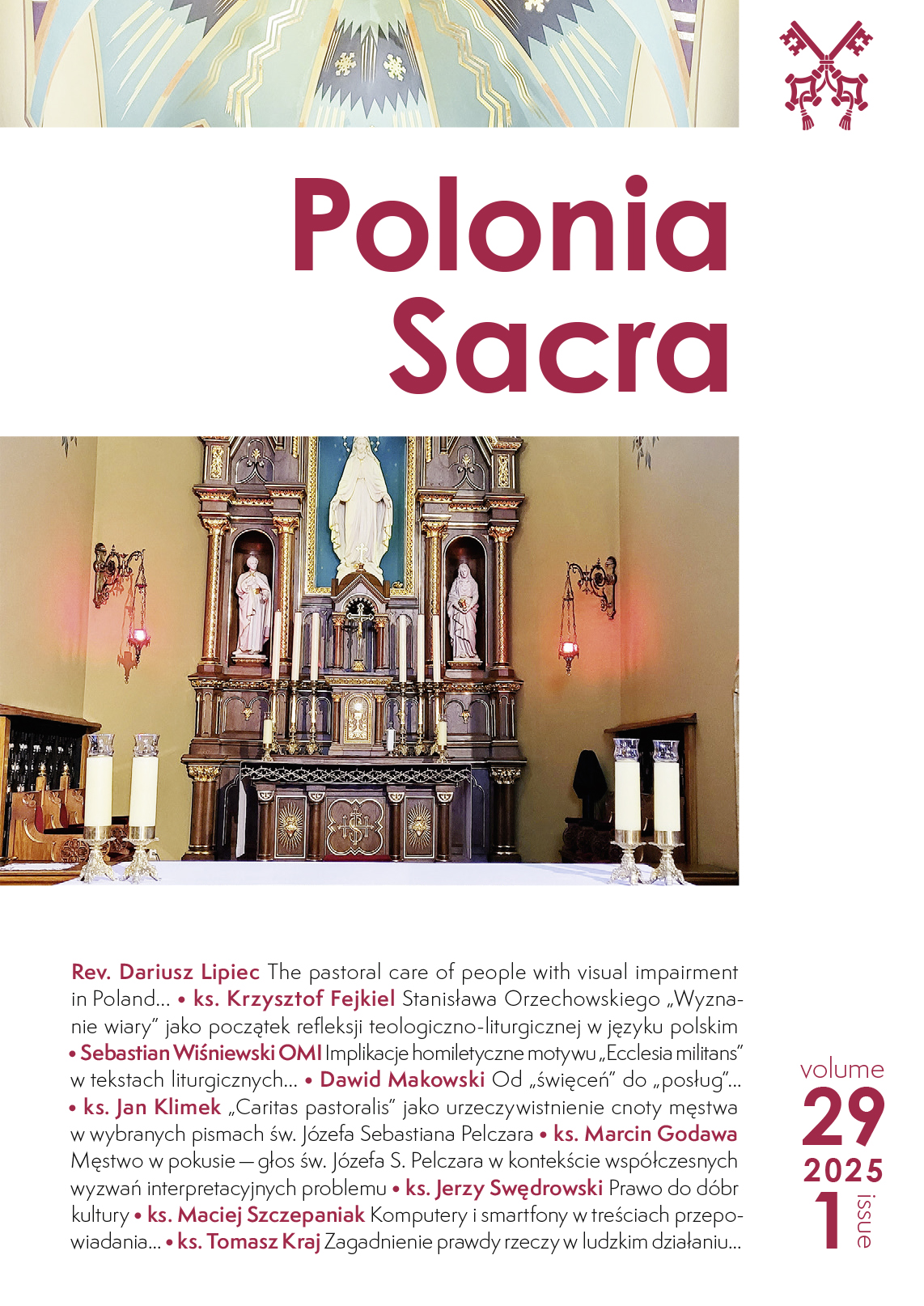The right to cultural goods
DOI:
https://doi.org/10.15633/ps.29107Keywords:
culture, life, family, community, solidarity, human dignityAbstract
Culture is the entirety of the material, civilizational and spiritual achievements of people. It is the result of creative human activity and a set of values, norms and principles that apply in a given community. Both in philosophy and theology we find numerous references to the rights of man, who alone is capable of striving to discover truth, goodness and beauty. A proper understanding of culture and its development allows us to see the action of God and His work of redemption, and at the same time the creative possibilities of man. The autonomy of culture and the freedom of man should lead to the discovery of the most important matters and their protection. Freedom of human decision is connected with the gift of life and the right to life. A living human being in their development is directed towards community in the bonds of blood, faith, and mutual support. The dimension of human solidarity is a special challenge and allows us to interpret the duties and opportunities for true unity. All undertaken actions, both personal and social, have a chance of success in the light of understanding and accepting the unconditional dignity of man.
References
Bartnik Cz., Kultura, w: Encyklopedia katolicka, t. 10, red. E. Ziemann, Lublin 2004, k. 188–193.
Benedykt XVI, Przemówienie do Kurii Rzymskiej o poprawnej interpretacji II Soboru Watykańskiego, 22.12.2005, http://sanctus.pl/index.php?podgrupa=91&doc=35 (05.09.2024).
Benedykt XVI, Adhortacja apostolska Verbum Domini.
Benedykt XVI, Encyklika Deus caritas est.
Benedykt XVI, Przemówienie do przedstawicieli świata kultury, Paryż, Kolegium Bernardynów 12.09.2008, https://www.vatican.va/content/benedict-xvi/pl/speeches/2008/september/documents/hf_ben-xvi_spe_20080912_parigi-cultura.html (05.09.2024).
Chlewiński Z. i in., Ideologia, w: Encyklopedia katolicka, t. 6, red. J. Walkusz, Lublin 1993, k. 1406–1425.
Chlewiński Z., Zaleski Z., Godność, w: Encyklopedia katolicka, t. 5, red. P. Hemperek, Lublin 1989, k. 1231–1232.
II Polski Synod Plenarny 1991–1999, Poznań 2001.
Dudek A., Kultura, w: Jan Paweł II. Encyklopedia nauczania społecznego, red. A. Zwoliński, Radom 2005, s. 258–259.
Dykasteria Nauki Wiary, Deklaracja Dignitas infinita, https://www.vatican.va/roman_curia/congregations/cfaith/documents/rc_ddf_doc_20240402_dignitas-infinita_pl.html (02.09.2024).
Dziuba A. F., Chrześcijaństwo a kultura, Warszawa 2008.
Dziuba A. F., Humanizująca funkcja kultury. Z nauczania kardynała Stefana Wyszyńskiego Prymasa Polski, Warszawa 2013.
Dziuba A. F., Służyć życiu, Niepokalanów 2012.
Franciszek, Adhortacja apostolska Evangelii gaudium.
Franciszek, Encyklika Fratelli tutti, 03.10.2020.
Jan Paweł II, Encyklika Evangelium vitae, w: Jan Paweł II, Dzieła zebrane, t. 1, Kraków 2006, s. 533–611.
Jan Paweł II, Homilia w czasie mszy świętej odprawianej dla świata pracy, Gdańsk, 12.06.1987, w: Jan Paweł II, Dzieła zebrane, t. 9, Kraków 2008, s. 383–388.
Jan Paweł II, Przemówienie do przedstawicieli świata kultury zgromadzonych w kościele Świętego Krzyża, Warszawa, 13.06.1987, w: Jan Paweł II, Dzieła zebrane, t. 9, Kraków 2008, s. 409–412.
Jan Paweł II, Przemówienie do przedstawicieli świata nauki, w: Jan Paweł II, Dzieła zebrane, t. 9, Kraków 2008, s. 316–321.
Jan Paweł II, W imię przyszłości kultury. Przemówienie w siedzibie UNESCO, Paryż, 2.06.1980, w: Jan Paweł II, Dzieła zebrane, red. P. Ptasznik, Kraków 2008, s. 99–108.
Skorowski H., Naród, w: Jan Paweł II. Encyklopedia nauczania społecznego, red. A. Zwoliński, Radom 2005, s. 306–310.
Sobór Watykański II, Konstytucje. Dekrety. Deklaracje, Poznań 2002.
Szostek A., Człowiek i kultura w ujęciu Jana Pawła II, „Łódzkie Studia Teologiczne” (1997) nr 6, s. 157–167.
Downloads
Published
Issue
Section
License
Copyright (c) 2025 Jerzy Swędrowski

This work is licensed under a Creative Commons Attribution 4.0 International License.
Authors who publish in this journal agree to the following terms:
- Authors retain the copyright and full publishing rights without restrictions and grant the journal right of first publication with the work simultaneously licensed under a Creative Commons Attribution 4.0 International License that allows others to share the work with an acknowledgement of the work's authorship and initial publication in this journal.
- Authors are able to enter into separate, additional contractual arrangements for the non-exclusive distribution of the journal's published version of the work (e.g., post it to an institutional repository or publish it in a book), with an acknowledgement of its initial publication in this journal.
- Authors are permitted and encouraged to post their work online (e.g., in institutional repositories or on their website) prior to and during the submission process, as this can lead to productive exchanges, as well as earlier and greater citation of published work (See The Effect of Open Access).

